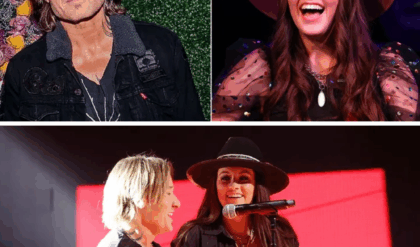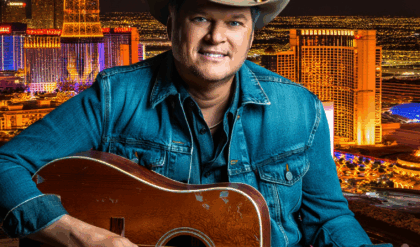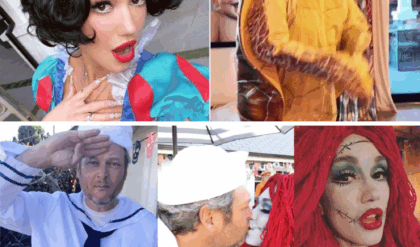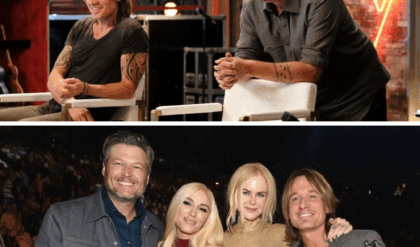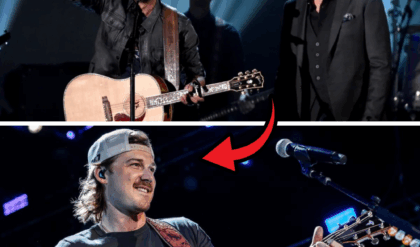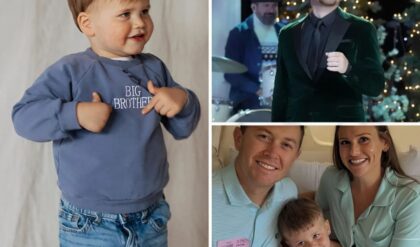In the frost-kissed isolation of rural Montana, where the wind howls like a forgotten lullaby and the horizon stretches into an endless, indifferent void, a single mother’s unraveling becomes a symphony of shattering silence. Netflix—no, wait, Mubi—has just unleashed the first trailer for Die, My Love, a psychological gut-punch of a thriller that pairs Oscar darlings Jennifer Lawrence and Robert Pattinson under the unerring gaze of director Lynne Ramsay. Produced by none other than Martin Scorsese, whose book-club serendipity birthed this beast, the film—adapted from Ariana Harwicz’s razor-sharp 2012 novel—dives headlong into the abyss of postpartum psychosis. Dropped on October 6, 2025, the two-minute teaser crackles with feral energy: Lawrence’s Grace clawing at shadows in a dimly lit kitchen, Pattinson’s Jackson frozen in helpless horror as a crib rocks ominously in the corner, and a score that blends Bowie’s brooding “Kooks” with dissonant strings that scrape like fingernails on bone. With a November 7 premiere locked in—pitting it against holiday heavyweights like Predator: Badlands and The Running Man—Die, My Love isn’t arriving; it’s erupting. Fresh off a nine-minute standing ovation at Cannes in May, where Lawrence’s raw, vein-popping performance left audiences gasping, this is the thriller that’s already rewriting the rules of domestic dread. Forget polite portrayals of parenthood; Ramsay’s vision is a Molotov cocktail hurled at the myth of maternal bliss, and it’s scorching everything in its path.
The trailer’s grip is immediate and unrelenting, opening on a wide shot of an sprawling, weathered farmhouse nestled against jagged peaks—a far cry from the novel’s anonymous French countryside, transplanted here by Ramsay’s co-writers Enda Walsh and Alice Birch for a distinctly American flavor of desolation. Grace (Lawrence), a once-aspiring New York writer whose pages now gather dust amid baby bottles and half-eaten casseroles, stares into a fogged mirror, her reflection fracturing like her fraying nerves. Cut to Pattinson’s Jackson, his musician’s hands—callused from guitar strings and gig vans—trembling as he cradles their infant son, whispering, “We’re in this together, right?” But the lie unravels in flashes: Grace smashing a plate against the wall, shards glinting like accusations; a midnight tryst in the barn where lust twists into violence; Jackson’s mother Pam (Sissy Spacek, all weathered steel and unspoken judgments) peering through lace curtains like a sentinel of suburbia’s sins. Voiceover snippets from Harwicz’s prose haunt the edges—”I need a buffalo and all I get is a porcupine”—as Grace’s internal monologue spirals: “Die, my love. Or live with me in the dirt.” Clocking in at under two minutes, the trailer ends on a gut-wrench: Grace, wild-eyed and rain-soaked, lunging at Jackson with a kitchen knife, his plea—”Grace, come back to us”—drowned in thunder. It’s not a tease; it’s a trauma dump, engineered to lodge in your psyche like a splinter you can’t dig out.
At its fevered core, Die, My Love is a love letter to the unspeakable horrors lurking in the nursery’s glow. Harwicz’s novella, a 2018 Man Booker International longlister that slices through the veneer of domesticity with surgical precision, follows an unnamed Argentine immigrant in rural France, her mind fracturing under the weight of new motherhood. Trapped in a cycle of feral urges—breastfeeding morphing into fantasies of infanticide, marital sex devolving into ritualized rage—she wages war on her own existence, her husband a bewildered bystander, her lover a fleeting escape hatch. Ramsay, whose filmography (Ratcatcher, We Need to Talk About Kevin, You Were Never Really Here) thrives on the poetry of pain, relocates the frenzy to Montana’s Big Sky badlands, amplifying the isolation to agoraphobic extremes. Grace isn’t just depressed; she’s possessed, her writer’s block a dam bursting into hallucinatory floods—visions of the baby as a changeling, neighbors as accusatory apparitions, Jackson’s absences (touring with his band) as betrayals etched in absence. The script, a collaborative fever dream from Ramsay, Walsh (the Hunger maestro), and Birch (Dead Ringers reimaginer), leans into the novel’s linguistic vertigo: fragmented monologues that blur memory and mania, where “love” becomes a verb of destruction.
Lawrence’s Grace is the film’s feral heartbeat, a performance so visceral it feels like autobiography weaponized. At 35, the Hunger Games icon and mother of two has long traded Katniss’s fire for roles that probe the psyche’s underbelly—Joy‘s entrepreneurial rage, Mother!‘s eco-horror hysteria—but this eclipses them all. In Cannes dailies, she prowls the set like a caged panther, her body language a lexicon of unraveling: shoulders hunched against invisible weights, fingers twitching toward the knife block, eyes darting like a cornered animal’s. “I didn’t act it,” Lawrence confessed in a post-premiere Variety sit-down, her voice raw from chain-smoking Marlboros between takes. “I lived it. Lynne had us improv naked fights on Day One—clawing, screaming, until we were black-and-blue. Motherhood’s my anchor; this was the storm that almost sank it.” Her prep was masochistic: shadowing postpartum support groups in Helena, Montana (where much of the film shot), devouring Harwicz’s trilogy (Feebleminded, Tender), and recording original demos with composer George Vjestica—haunting covers of Lou Reed’s “Perfect Day” twisted into dirges. Critics at Cannes, still buzzing from that interminable ovation, crowned her “a force of nature unmoored,” with The Hollywood Reporter‘s David Rooney dubbing it “Lawrence’s There Will Be Blood—blood here being breast milk and bourbon.” Oscar whispers? Deafening. It’s her fiercest bid since Winter’s Bone, a role that demands she weaponize her own maternal glow against the darkness.
Pattinson, meanwhile, is the quiet counterweight, his Jackson a portrait of emasculated devotion that peels back the Twilight pretty-boy to reveal a man adrift in his own inadequacy. Post-The Batman‘s brooding billionaire and Mickey 17‘s cosmic everyman, the 39-year-old Brit brings a haunted tenderness to the role—his lanky frame slouched in flannel, voice cracking on pleas for normalcy, hands that cradle the baby like a fragile artifact. “Rob’s the only one who could make helplessness heroic,” Ramsay told Deadline during the Croisette scrum. “He’s not the villain; he’s the mirror Grace shatters against.” Their chemistry simmers with tragic intimacy: stolen glances over crib rails laced with longing and loathing, a barn dance sequence—choreographed in humiliating pre-shoot lessons, per Pattinson’s IndieWire anecdote—that devolves into a primal tangle of limbs and lies. Supporting turns amplify the unease: Spacek’s Pam, a chain-smoking matriarch dispensing passive-aggressive pies laced with judgment; Nick Nolte as Jackson’s grizzled uncle, his ranch a graveyard of failed dreams; LaKeith Stanfield as a enigmatic lover whose midnight visits ignite Grace’s fleeting fires. It’s an ensemble that orbits Lawrence’s supernova, each performance a shard in the mosaic of marital implosion.
Ramsay’s direction is the film’s secret weapon, a stylistic sorcery that turns the mundane into the menacing. Absent from features since 2017’s hammer-swinging You Were Never Really Here, the Scottish auteur—whose Palme d’Or snubs (We Need to Talk About Kevin) have become Cannes legend—wields her camera like a scalpel, carving intimacy from chaos. Shot on 35mm by The Batman‘s Greig Fraser (stepping in for Ramsay regular Seamus McGarvey, sidelined by scheduling), the visuals pulse with tactile dread: close-ups of milk leaking through nightgowns like stigmata, slow-motion rain sheeting farmhouse windows like tears, dream sequences where the baby morphs into a spectral buffalo stampeding through wheat fields. Editor Joe Bini (There Will Be Blood) fractures time—flash-forwards to institutional whites bleeding into pastoral greens—mirroring Grace’s psychosis, while Vjestica’s score (co-written with Ramsay) layers punk anthems (*The Chipmunks’ warped “Monster Mash” over a crib-side breakdown) with original laments, Grace’s vocals—raw and recorded on-set—haunting like a siren’s wail. “Lynne doesn’t direct; she unleashes,” Pattinson quipped at Cannes, nursing a bruised rib from an improv scuffle. The result? A film that’s “brutal but beautiful,” per Screen International‘s Tim Grierson, a slow-burn psychodrama that wallows in dysfunction without cheapening its truths.
The Cannes debut was electric, a midnight screening in the Grand Théâtre Lumière that erupted into chaos: nine minutes of foot-stomping ovation, Lawrence burying her face in Pattinson’s shoulder, Ramsay—tear-streaked and beaming—blowing kisses to the throng. “This is for every mother who’s screamed into the void,” she rasped in her acceptance speech, dedicating it to Harwicz, who flew in from Paris clutching a dog-eared copy of her own book. Mubi, the indie darling behind Aftersun and Past Lives, swooped in for $24 million—its priciest acquisition ever—edging out A24 and Neon in a frenzy that spilled into yacht parties on the Croisette. Early reviews? A feast: Variety‘s Owen Gleiberman called it “a frenzied depiction of the oft-ignored, too stylistically mannered to fully connect but gifting Lawrence one of her most vivid roles”; The Guardian‘s Xan Brooks hailed Ramsay’s “expert sound design and mixed-up chronology” for conveying “bleary adriftness.” Metacritic sits at 75/100—”generally favorable,” with naysayers griping the “overwrought” tone risks exhaustion. Yet for many, it’s catharsis: a film that dares to ask, “What if love is the monster?” without flinching from the fangs.
Scorsese’s imprimatur adds mythic weight, his Sikelia Productions the fairy godmother that sparked it all. In 2020, amid pandemic isolation, Marty—ever the voracious reader—devoured Harwicz’s novel in his Hamptons book club, its feral prose echoing Taxi Driver‘s urban alienation but transposed to the hearth. “It hit me like a freight train,” he recalled in a New Yorker profile, dispatching a marked-up copy to Lawrence’s Excellent Cadaver banner. JLaw, then pregnant with her first, devoured it in one sleepless night: “It was like staring into my own abyss—beautiful, terrifying.” By 2022, with Ramsay attached (after initial hesitations over the “unfilmable” stream-of-consciousness), the dream team coalesced: producers Justine Ciarrocchi and Andrea Calderwood wrangling a $40 million budget, Black Label Media (the Sicario crew) handling logistics. Shooting wrapped in Helena’s high-desert wilds last fall—Ramsay insisting on practical effects, no green-screen crutches—amid whispers of on-set intensity: Lawrence’s method immersion (sleeping in the prop crib for “authenticity”) and Pattinson’s dance boot camp yielding a pivotal sequence that’s equal parts Dirty Dancing and Rosemary’s Baby.
As November 7 dawns, Die, My Love arrives not as escapism, but exorcism—a mirror held to the invisible epidemics gnawing at modern families. Postpartum depression claims 1 in 7 mothers, yet Hollywood’s palette runs pink and precious; Ramsay’s antidote is unsparing, blending Harwicz’s “wild beauty” with punk-rock pathos. For Lawrence, it’s a pivot: post-maternity leave, she’s selective, her next slate (The Wives with A24) eyeing more “unhinged women.” Pattinson, riding Mickey 17‘s sci-fi wave, teases “more indies like this—raw, real, reckless.” In a landscape bloated with franchises, Die, My Love is a rogue wave, crashing against the complacency of “feel-good” motherhood tales like Tully or Pieces of a Woman. Box-office prognosticators peg an $18 million opening—modest, but Mubi’s playbook thrives on awards-season alchemy, with Venice whispers already fueling JLaw’s fifth nom.
Yet beyond metrics, it’s a cultural clarion: Harwicz, the Argentine firebrand whose trilogy dissects feminine fury, beams from afar—”They captured the rage without romanticizing it.” Ramsay, in a rare Sight & Sound dispatch, muses, “Motherhood’s a battlefield; love’s the bayonet. This film’s my white flag.” As the trailer’s final frame fades—Grace and Jackson silhouetted against a blood-orange sunset, baby wailing off-screen—the ache lingers. Die, My Love doesn’t resolve; it resonates, a haunting hymn to the loves that devour us whole. Stream the trailer, steel your nerves, and brace for November: in Ramsay’s world, happily ever after is the real fairy tale. This one’s for the survivors—the mothers who rise from the ashes, scarred but sovereign.
